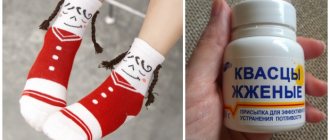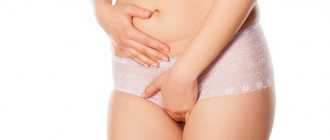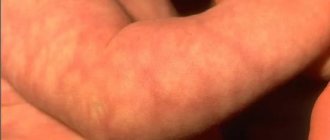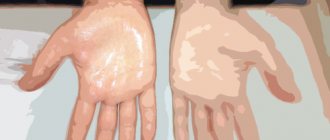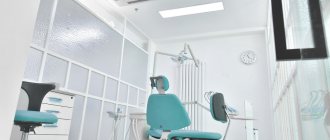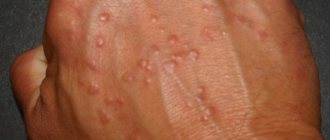Night sweats can have many causes, from medication-related side effects to serious health problems. Episodic sweating at night should not be a cause for concern, however, if it occurs frequently, you should consult an endocrinologist.
Learn about the most common causes and symptoms of night sweats that indicate it's time to see a doctor.
Excessive sweating at night is a problem for many people and is most often not related to the environment. There are times when sweating can be caused by something completely harmless, such as the temperature in the bedroom, bedding, or even food eaten before bed. However, if excessive sweating is observed, the cause will most often be medical. In such cases, it is recommended to consult a doctor in order to find the cause in time and begin treatment.
Types of hyperhidrosis
Hyperhidrosis can be local (localized) or generalized (generalized). When localized, increased sweating manifests itself in certain areas of the body, most often the armpits, palms, knees and elbows, and soles. Sweating may increase in one of these areas or in all of them together. This type of hyperhidrosis is usually caused by increased excitability of the nervous system, in some cases by heredity.
General hyperhidrosis is characterized by excessive sweating over almost the entire surface of the body. It can be physiological, associated with changes in hormonal levels - in adolescence, pregnancy, menopause, and also be a symptom of infectious diseases, functional disorders or diseases of the endocrine and nervous system.
How to improve your night's sleep
An examination and a change in diet are only the first steps towards eliminating excessive sweating. To improve night sleep, it is also important to reduce exposure to factors that provoke an increase in body temperature:
- Before going to bed, the room should be well ventilated.
- It is advisable to sleep in a cool room.
- In summer you should not cover yourself with a warm blanket. A thin sheet is quite enough.
- Before going to bed, it’s good to take a warm (not hot!) bath. It perfectly relaxes the nerves and normalizes the functioning of the endocrine system.
- Under no circumstances should you overeat at night!
Another surefire way to get a good night's sleep is to buy a quality coconut coir mattress. This natural material is perfectly ventilated and prevents the formation of a “greenhouse” effect. It is comfortable to sleep on it at any time of the year.
Buy orthopedic mattresses in Moscow in the Sleep Magic online store.
Deviations from the norm and causes of pathology
In addition to an increase in the amount of sweat even at rest, hyperhidrosis is accompanied by the following symptoms, which can appear individually or in combination:
- pungent odor of sweat (bromidrosis) even with proper hygiene;
- ineffectiveness of hygiene products: deodorants, antiperspirants;
- staining of sweat (chromidrosis) due to intoxication of the body or taking certain medications;
- abrasions and redness in areas of increased sweating.
Hyperhidrosis is divided into primary and secondary, they are caused by different reasons. Primary – characteristic of adolescence and appears during puberty in less than 1% of people.
Secondary hyperhidrosis is a consequence of endocrine, somatic, tumor and other pathologies. It can also accompany normal physiological conditions - menopause, pregnancy.
Each of these types of hyperhidrosis is divided according to its location. Primary is divided into:
- palmar (palmar);
- axillary (axillary);
- foot (plantar);
- hyperhidrosis of the face and scalp (craniofacial);
- perineal (perineal).
Secondary:
- general;
- regional – appears due to damage to peripheral nerves, cerebrovascular disorders;
- focal – Frey's syndrome, eccrine nevi.
Currently, there is no consensus on why primary hyperhidrosis occurs. It is generally accepted that it is based on increased activity of the central division of the sympathetic nervous system.
The main common causes of secondary hyperhidrosis:
- endocrine – diabetes mellitus, increased levels of thyroid hormones;
- lipid metabolism disorder - obesity;
- hormonally active tumors;
- inflammatory and infectious diseases - often tuberculosis, endocarditis;
- psychosomatic pathologies.
In women and men, in addition to the general ones, there are specific causes of heavy sweating. In women, hyperhidrosis is often caused by an increase in the level of sex hormones: estrogen, estradiol, progesterone, prolactin during menstruation, pregnancy, when taking contraceptives, as well as changes in hormonal levels during menopause and the postpartum period.
The cause of increased sweating throughout the body in men is often the level of testosterone. After 40-50 years, the level of this hormone in the body decreases, which disrupts autonomic regulation, as a result of which sweat production increases. Increased sweating can also be caused by nicotine addiction.
Nocturnal hyperhidrosis is classified as a separate category, which is diagnosed in both women and men. There are several reasons for heavy sweating during sleep:
- Sleep apnea syndrome . Mostly typical for men, especially those suffering from constant snoring. 1-2 hours after falling asleep, during deep sleep, heavy sweating begins, and a short-term breath holding suddenly occurs (for a few seconds). After breathing is restored, profuse sweating also occurs.
- Withdrawal syndrome . It is typical for both men and women suffering from alcoholism. With a sudden cessation of alcohol intake, dysfunction of all body systems, malfunctions of various organs, and severe intoxication occur. This condition is characterized by attacks of profuse sweating - very profuse, even to the point of wet underwear and bed linen. Sweat has an unpleasant odor. A similar situation is observed with drug addiction.
- Tuberculosis is often the cause of excessive sweating at night, while with other diseases sweating can increase at any time of the day.
Treatment
Help before diagnosis
To reduce night sweats associated with bad habits, a man should adhere to several rules: avoid heavy meals and alcohol at night, quit smoking if possible, and normalize sleep patterns. To eliminate skin irritation, you need to shower regularly and change bedding more often. If sweating is accompanied by other unpleasant symptoms, you should visit a doctor to rule out or confirm more serious causes of the disorder.
Conservative therapy
Medical tactics depend on the etiological factor. Most often, etiotropic therapy is carried out to eliminate the underlying disease, and a decrease in pathological sweating is observed. If hyperhidrosis is caused by withdrawal, addiction treatment is carried out in specialized centers and involves a combination of medications with psychotherapeutic assistance. To treat the cause of severe sweating at night in men, the following groups of drugs are used:
- Hormonal agents
. Pathogenetic treatment with androgens during male menopause helps eliminate bouts of fever and night sweats, normalizes the functioning of the genitourinary system and increases sexual desire. For patients with diabetes mellitus, a suitable insulin therapy regimen is selected to correct glycemia. - Antibiotics
. The drugs are indicated for bacterial infections of any location for rapid eradication of the pathogen from the body. Antibiotics are selected empirically, as well as taking into account the results of bacteriological tests. Antifungal and antiviral agents may be prescribed. - Anti-inflammatory drugs
. Medicines from the NSAID group quickly normalize body temperature, reduce the amount of inflammatory cytokines and speed up the healing process. In severe situations, NSAIDs are combined with interferons and specific immunoglobulins. - Sedatives
. Herbal and synthetic preparations affect the functioning of the autonomic nervous system, thereby reducing the function of the sweat glands and eliminating the unpleasant manifestations of night sweats. If necessary, “daytime” tranquilizers and antidepressants are added to the treatment regimen.
Diagnosis of hyperhidrosis
A dermatovenerologist is involved in diagnosing and treating excessive sweating. The doctor collects the patient’s medical history and prescribes tests and instrumental studies to exclude internal pathologies. As a rule, the patient needs to do:
- general blood test, urine test;
- blood chemistry;
- ECG;
- Ultrasound of the pancreas.
Additionally, other studies and consultations with doctors of various specialties may be prescribed.
To determine the degree of sweating intensity, a Minor test (iodine-starch test) is done. To study the composition of sweat, a chromatographic study is carried out.
Cost of eliminating sweating in women
| Name | Price |
| Primary appointment (examination, consultation) with a cosmetologist | 1,500 rub. |
| Treatment for sweaty palms | 400 rubles/unit |
| Treatment of sweaty feet | 400 rubles/unit |
| Treatment for armpit sweating | 400 rubles/unit |
| Treatment of sweating of the head (face) | 400 rubles/unit |
| Treatment of other sweating (perineum, folds under the breasts, etc.) | 400 rubles/unit |
| Treatment of sweating underarms, palms and feet with Botox | 400 rubles/unit |
| Curettage | 55,000 rub. |
Preventive measures
To prevent hyperhidrosis, it is first necessary to exclude the development of somatic diseases and promptly treat chronic pathologies. To do this, you need to regularly visit a doctor for medical examination or prescribe treatment.
If excessive sweating is not a consequence of other diseases, you should adhere to the following measures:
- exclude spicy, hot dishes, spices, alcohol from the menu;
- stop smoking;
- take a contrast shower, warm baths with herbal decoctions (chamomile, oak bark);
- do not take medications without a doctor’s prescription;
- in clothing, give preference to natural fabrics (cotton, linen);
- shoes should be made of genuine leather or breathable materials with special moisture-absorbing insoles.
Article sources:
- Hyperhidrosis: method of correction. Batyrshina S.V., Khaertdinova L.A. Practical medicine No. 8, 2014. p. 16-23
- Hyperhidrosis and its impact on those living with it. Mary Lenefsky, 1Department of Dermatology, Emory University School of Medicine, Atlanta, GA, 2022.
- Pathophysiology and Treatment of Hyperhidrosis. Tomoko Fujimoto. 1Department of Dermatology, Graduate School of Medical and Dental Sciences, Tokyo Medical and Dental University, Tokyo, Japan. 2016
- Axillary hyperhidrosis: a focused review. Jason E Sammons, Amor Khachemoune. Department of Clinical Medicine, Avalon University School of Medicine, Willemstad, CW, USA. 2b SUNY Downstate and VA Medical Center, Brooklyn, NY, USA. 2017
Content:
- Total information
- Causes of hyperhidrosis in alcoholics
- Clinical picture
- Associated symptoms
- If you break into a sweat after a binge, what should you do?
The human body constantly produces sweat secretions. Their number can increase both normally and in a number of pathologies. If you break into a sweat after a binge, does this mean that there are problems in the alcoholic’s organs and tissues? If any appear, are they serious or not, and how to deal with them?
Pregnant woman sweats in her sleep
And this happens quite often. Moreover, probably every expectant mother (especially in the later stages of pregnancy) has encountered increased night sweats. The baby in the womb grows quickly, kicks, and often at night.
If you are concerned about night sweats, then:
- Be sure to ventilate the room before going to bed, without fear that you will be a little cool at first;
- Control the humidity level - if you don’t have a humidifier, it’s time to buy one, it’s more important for your baby than new onesies and fashionable pacifiers;
- Adhere to a certain daily routine - go to bed at the same time and get up according to a set schedule;
- Use nightgowns only made of breathable materials;
- Bed linen should be appropriate for the season - in the summer, many people prefer to cover themselves with a sheet or a light blanket, and rightly so;
- Avoid household chemicals - you don’t need air flavors, air fresheners and other devices that pollute the air with synthetic substances.
All methods should be simple and accessible. But you shouldn’t resort to traditional treatment for hyperhidrosis during pregnancy: these are unnecessary risks for you and your baby. Use even regular antiperspirant deodorant as little as possible: its composition is far from natural.
general characteristics
Excessive sweating is a subjective complaint: patients notice that they sweat more than other people.
A person finds wet stains from sweat on clothes, not only in the armpits, but also on the chest or back. Sweating is combined with cold skin and an unpleasant, pungent odor that can be easily felt from a distance. Patients may note that a large amount of sweat appears only on certain parts of the body - for example, on the palms and soles of the face. Increased sweating is provoked by stress, minor physical activity, and food intake. The symptom also causes psychological disorders: the person begins to experience a feeling of shame, discomfort, and avoid contact with others. Great inconvenience is caused by excessive sweating of the palms, which interferes with professional activities and makes it difficult to meet people and shake hands. A short-term increase in sweat production in response to physical labor or emotional shock is considered normal, but persistent hyperhidrosis, which disrupts the quality of life, is an indication for contacting a specialist.
Why do pregnant women sweat more?
If you really start to sweat more, but you can’t say that you’re practically drenched in sweat from morning to evening, this is normal. Moderate sweating with a slight increase compared to the pre-pregnancy period is the absolute norm. This is how your body tries to protect itself from overheating. Hormones also do not work stable, and the endocrine system increases the rate of activity of the sweat glands.
Many organs of the mother’s body have to undergo serious restructuring: this leads to the water-salt balance being disturbed. And the results of these changes are obvious - you see that sweating has become profuse, that the skin has become drier and began to peel, and that irritation and itching sometimes appear in some places.
What's happening to my body?
Sweating during pregnancy, in a certain sense, is triggered by hormonal changes. The activation of the production of new hormones begins, without which the body will not maintain pregnancy. But the concentration of the previous hormonal composition may decrease slightly. This process is completely normal. Your endocrine system functions in a new mode; it directs the production of hormones to regulate water-salt metabolism. But, unfortunately, such an imbalance leads to narrowing/dilation of blood vessels. As a result, the body overheats and sweating increases.
The nervous system also faces a small revolution:
- You increasingly feel emotional instability;
- Sometimes you feel an increased heartbeat, rapid breathing;
- Body temperature can sometimes rise for no reason;
- You feel a rush of blood to your face and body for no apparent reason;
- You experience sudden weakness, your head begins to feel very dizzy and your legs begin to give way.
These phenomena may never appear, or may be a frequent companion throughout the entire gestation period. But usually they occur during a period of toxicosis, which is exhausting and truly unbearable for many women. In this case, you should definitely tell your doctor about what is happening. If he sees the need for hospitalization, then do not refuse. Most expectant mothers need peace, good nutrition and rest at this time.
The hotter it is outside, the greater the risk that after bouts of sweating and increased heart rate, as well as lack of air, you will actually feel ill. When going outside in the heat, carry a bottle of water in your bag. Try to walk in shaded areas, and don’t be afraid to ask for help if you already feel your legs giving way. If you have the opportunity not to leave the house on such days, stay in your usual conditions - rest, read, drink a lot. Take a shower with water that is comfortable for you.
If you break into a sweat after a binge, what should you do?
There is no miracle pill that will eliminate hyperhidrosis. The condition can be alleviated with a warm shower or bath. But if a drinker wants to get rid of excessive sweating forever, he must completely stop drinking alcohol. Highly qualified specialists will help him with this. During treatment the following is carried out:
- detoxification;
- psychotherapy;
- resocialization.
Detoxification is aimed at removing ethanol and its derivatives from the body. The patient is given infusion therapy - various solutions are injected, after which ethyl alcohol and metabolites are excreted in the urine.
With the help of psychotherapy, a person’s mental dependence on alcoholic beverages is destroyed.
If excessive sweating in alcoholics is aggravated due to neurocirculatory dystonia, it can be relieved by NCD treatment methods. This:
- hardening procedures;
- physical education;
- taking sedatives;
- balneotherapy (hydrotherapy).
Thanks to resocialization, the patient is taught to live in society again, which helps to avoid possible relapses.
Associated symptoms
Heavy sweating after heavy drinking is accompanied by such symptoms as:
- hyperemia (redness) of the skin;
- increased heart rate;
- increased breathing;
- feeling of heat;
- arterial hypertension - increased blood pressure.
Skin hyperemia can be:
- solid. The appearance of the drinker is as if he had come out of a bathhouse or sauna;
- in the form of spots.
An increased heart rate is often accompanied by an irregular heart rhythm.
Increased breathing occurs, as a rule, simultaneously with the emerging pathology of the cardiovascular system.
In addition, other signs are identified that often develop due to the absorption of large amounts of alcohol:
- nausea;
- vomit;
- epigastric pain;
- vestibular disturbances;
- mental and emotional disorders.
The described pathology may be one of the signs of alcohol intoxication (alcohol poisoning). If during a feast it is discovered that a person has suddenly become covered in perspiration, it is necessary to find out what his general health is, whether there are any other pathological signs, and, if necessary, call an ambulance.




